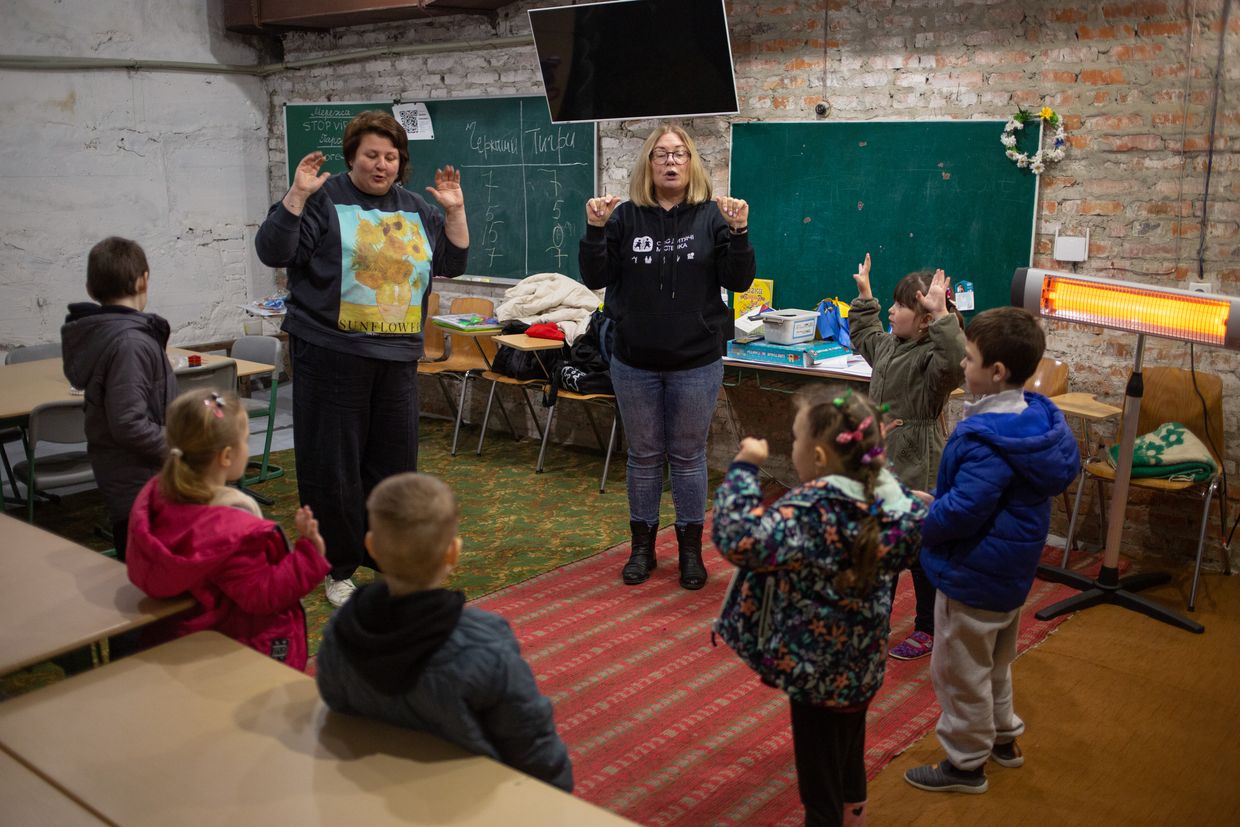Editor’s word: In accordance with newsroom coverage on reporting on kids and the insurance policies of organizations interviewed, the Kyiv Impartial isn’t utilizing the names of kids underneath 18 or the final names of their dad and mom who seem on this story.
When the youngsters arrive at a basement shelter within the Savyntsi Group Heart, psychologist Olena Husman, in her blonde bob and tortoise-shell glasses, stoops all the way down to greet a younger lady in pigtails with a excessive 5.
As Husman and one other psychologist lead the elementary school-aged kids in dancing to kids's songs on this cloudy April day, one after the other, the youngsters heat up and take away their coats.
"Good morning, the solar says howdy! Good morning, the sky is blue! Good morning, there are birds within the sky!"
The youngest is 4 years outdated, and the youngsters spin with airplane arms and hop round like frogs to music performed from a Bluetooth speaker. A glowing house heater retains the room heat, whereas sheets and hand-drawn cartoons dangle from the pipes, adorning the cement partitions that defend them from aerial assaults.
Savyntsi, a neighborhood 85 kilometers southeast of Kharkiv, survived heavy shelling and 6 months of occupation in 2022. Residents have been tortured and disappeared, and lots of households fled. Dwelling to round 10,000 earlier than the full-scale invasion started, lower than 1 / 4 of the inhabitants remained when the occupation ended. Kids who stayed behind spent a lot of the time hiding from Russian troops who occupied their city.
Many returned residence since Ukrainian forces pushed again Russian troops throughout the Kharkiv counteroffensive. In the present day, Savyntsi has 5,850 residents, together with 697 kids.
"It is extremely vital that our kids nonetheless have a childhood, even when it was partially stolen by navy aggression," says Liliia Novoselska, the village council’s chief schooling division specialist. "The kids have been underneath occupation for a very long time, sitting in basements."
"As the pinnacle of our navy administration says: 'We have been capable of pull the youngsters out of the basements, however it is vitally troublesome to get the basements out of their heads.'"
“It is extremely vital that our kids nonetheless have a childhood, even when it was partially stolen by navy aggression.”
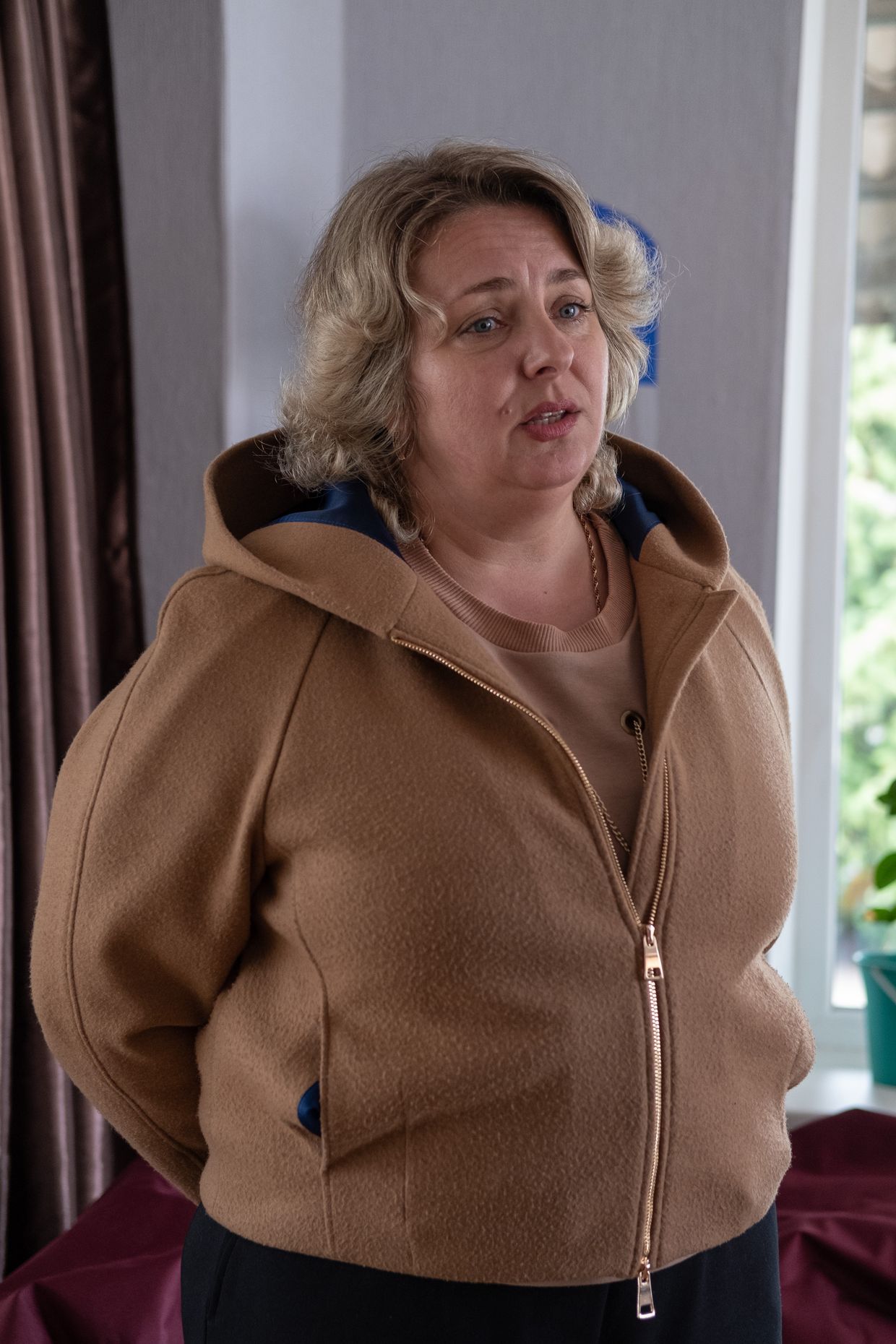
Liliia Novoselska, Savyntsi’s chief schooling division specialist, is seen throughout an interview at a college in Savyntsi, Kharkiv Oblast, Ukraine, on April 1, 2025. (Chris Jones / The Kyiv Impartial)
4 days per week, groups from the worldwide youth support company SOS Kids’s Villages convey psychological well being providers to kids in varied rural settlements. These small communities nearer to the battle traces usually have the least entry to psychological healthcare in all of Ukraine, but have been uncovered to a few of the most traumatic circumstances of the conflict.
Though it's simply after 10 a.m. throughout the workforce's weekly session in Savyntsi, it's not possible to inform this within the underground room with no home windows. Behind the dancing kids, a social employee meets with dad and mom to inform them about their packages and ask in the event that they need assistance acquiring issues like dishes or rain boots, whereas one other psychologist counsels dad and mom individually and in teams close by.
The kids leap and clap their fingers collectively, singing the worldwide mega-hit youngsters track "Child Shark," whereas the shyest youngsters disguise underneath a desk till they’re comfy sufficient to affix the group. One boy has walked an hour together with his mom from an space with little public transport to attend. Later within the day, older teams of center schoolers and youngsters will arrive.
Greater than 6 million Ukrainians are estimated to have left the nation for the reason that full-scale invasion, usually forsaking their properties and possessions whereas taking with them their abilities and experience.
The native authorities of Savyntsi, like these of many different communities within the nation, has been working to encourage households to remain within the village and assist rebuild their neighborhood and their homeland, Novoselska tells the Kyiv Impartial. Bringing in baby psychologists is a part of this effort, because the neighborhood has none of its personal.
"We will be unable to dwell one other life, we is not going to get one other likelihood," Novoselska says. "We adults should do the whole lot as greatest as attainable in order that our kids are joyful."
Considered one of Ukraine's greatest challenges
Husman estimates she spends no less than 5 hundred hours every year at the back of their white van stamped with the SOS Kids's Villages emblem. Her workforce members, a gaggle of six psychologists and specialists, sway in opposition to each other on sharp turns and potholes of their native Kharkiv Oblast.
They cross buildings struck by glide bombs and thru navy checkpoints, till buildings give method to woods after which to fields of darkish soil surrounded by small crimson indicators warning of landmines.
Husman, now 53, spent practically 20 years as a trainer, then virtually one other decade as a non-public observe psychologist working with kids with particular wants. Her present work with SOS Kids's Villages rings near residence as a mom and native of the area herself.
"I’m nonetheless not used to it," Husman says. "You see the eyes of those kids. Right here, there are displaced households, orphaned kids, perhaps somebody’s dad and mom simply died not too long ago. You take a look at these kids, and they’re nonetheless residing on the entrance traces. They’ve an opportunity for a distinct life, however all of them disguise when the Shaheds (kamikaze drones) fly. How are you going to get used to this?"
Addressing psychological well being issues will probably be certainly one of Ukraine’s greatest challenges within the coming years, the nation’s social coverage minister informed the Kyiv Impartial in March.
A World Well being Group survey present in 2024 that psychological misery is probably the most prevalent well being challenge within the nation. Practically half of Ukrainians face some type of psychological well being concern, in keeping with WHO knowledge. These numbers rise to round three-quarters or extra in areas closest to the entrance traces, together with Kharkiv. Based on Well being Ministry knowledge, the most typical causes for Ukrainians to hunt psychological well being therapy are anxiousness, sleep problems, despair, and issues with reminiscence.
Psychologists working with kids and their caretakers say Ukraine’s youth have additionally fallen behind on socializing with others their age, particularly close to the entrance traces, the place education is held remotely and youngsters in some communities spent months in hiding.
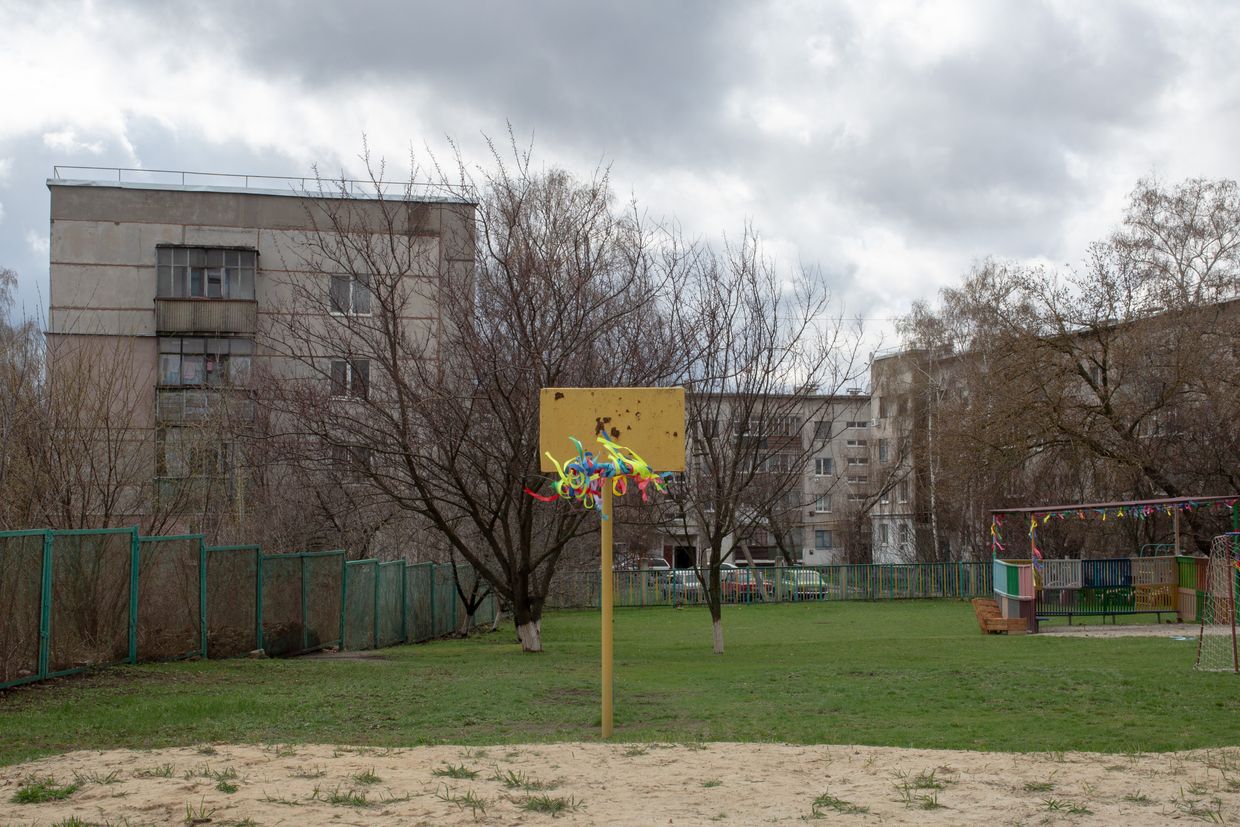
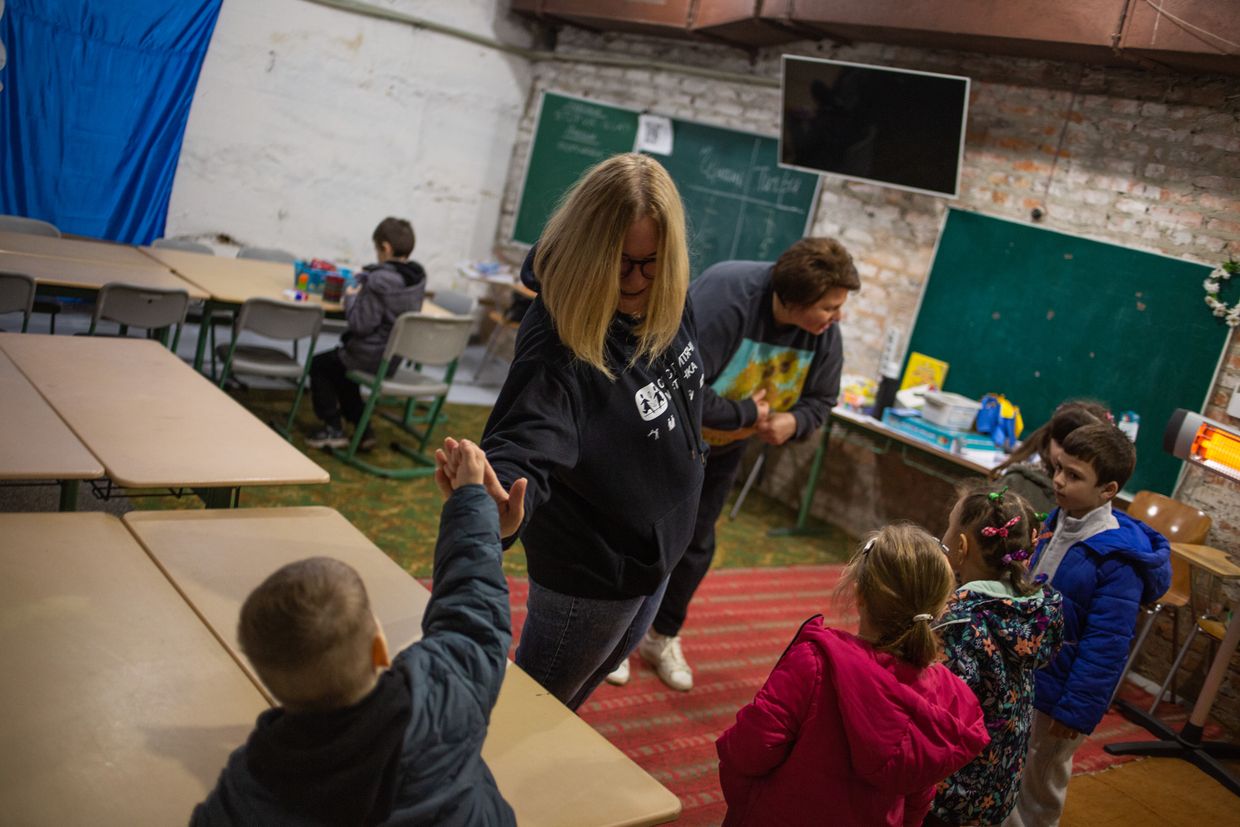
"There’s a need to speak, however the expertise are lacking," says Husman. "And there may be usually one other downside: they’ll’t be organized." In massive teams, kids lag behind their typical age group's potential to observe instructions, she explains: "They don't perceive construction."
SOS Kids’s Villages has a number of groups working in several oblasts, making weekly visits to the villages they serve. With the assistance of glitter, clay, markers, music, and video games, the workforce designs tailor-made actions for every group to assist the youngsters talk with each other and specific their emotions.
The third group of kids who go to the shelter in Savyntsi are youngsters. On this explicit day, they’re making collages depicting their desires of the long run and presenting them to the remainder of the group. One boy, who desires of visiting London, makes use of a glue stick to stick a British flag subsequent to a cartoon of Large Ben. Two ladies take a look at footage of fragrance, whereas one other boy chooses a picture of an costly necklace. He needs to purchase his future spouse jewellery, he explains.
“Within the Soviet Union, psychiatric hospitals and psychiatry usually have been punitive. It was a method to fight individuals who have been in opposition to the communists.”
Olena, a resident of Savyntsi with seven kids, arrives on the basement to choose up her younger daughter. After the conflict started, her eldest son, a young person, closed himself off and "doesn’t share a lot," she says. Her eight-year-old daughter started stuttering in school with worry, however "can’t say what she’s afraid of."
Since a number of of her youngsters started attending the weekly courses, she’s seen them opening up extra with their friends. "When the ladies started coming to us, (my youngsters) have been afraid. They have been hiding, scared. Now they’re not as afraid," she says, earlier than taking her daughter residence.
 The Kyiv Independent
The Kyiv Independent.jpg)
Submit-Soviet destigmatization
"Within the Soviet Union, psychiatric hospitals and psychiatry usually have been punitive. It was a method to fight individuals who have been in opposition to the communists," says Yuliia Okhmat, deputy coordinator for the psychological well being and psychosocial help division of the worldwide medical support group Worldwide Medical Corps (IMC). "That’s not the case now in Ukraine, nevertheless it takes time to dispel this fable — particularly amongst older folks."
For the reason that full-scale Russian invasion of Ukraine in February 2022, nonprofits, authorities ministries, and worldwide businesses have joined forces to search out new methods to deal with Ukraine’s unseen wounds. Therapists, psychologists, and social staff have been built-in into groups that deploy as speedy response to strike websites, one-time neighborhood well being visits, and long-term outreach to distant areas with few providers. Lots of of cellular groups are presently deployed throughout the nation, finishing up consultations with each kids and adults.
Adults, nonetheless, are sometimes extra immune to accepting providers. Whereas psychological well being help is stigmatized in lots of international locations for a lot of completely different causes, Ukraine has the extra barrier of its previous.
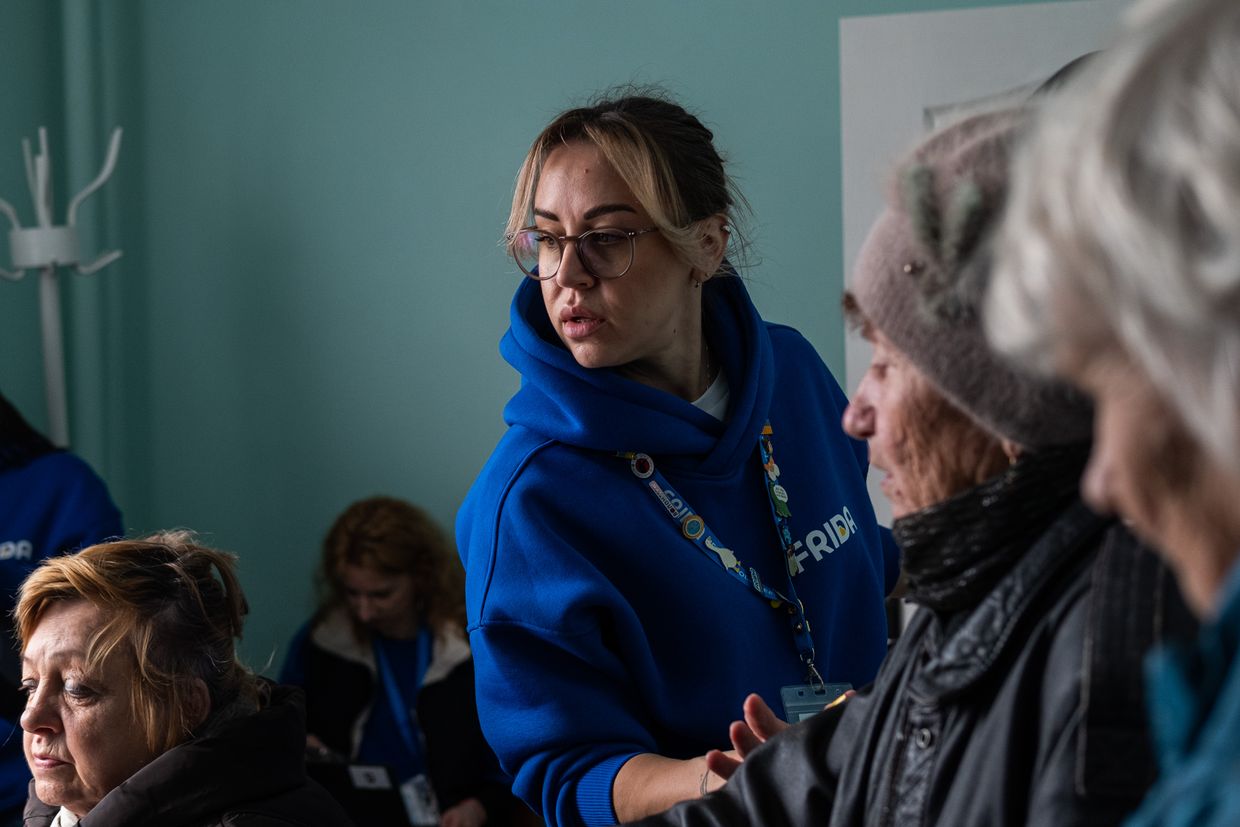
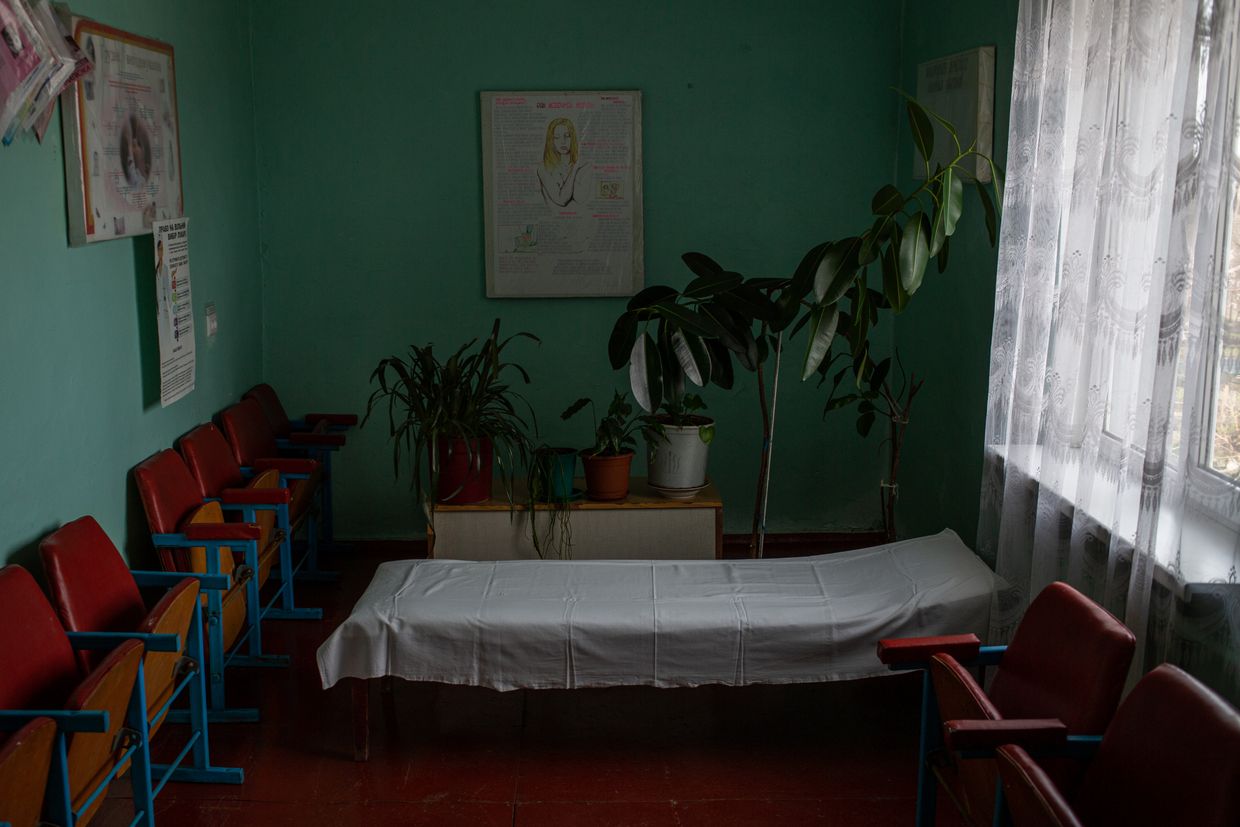
Researchers estimate that tens of hundreds of individuals deemed to be dissidents have been imprisoned in psychiatric "hospitals" throughout the Sixties to Eighties Soviet Union, the place sufferers have been crushed and given psychiatric medicines like haloperidol as torture and management. Russian forces have not too long ago revived the observe of punitive psychiatry within the occupied Ukrainian territories.
The IMC has been working to dispel disgrace and misconceptions round therapy each by visiting communities and gaining their belief over time and by supporting nationwide communication campaigns. It has carried out greater than 30,000 psychological well being consultations for the reason that outbreak of the full-scale invasion and trains well being care staff and neighborhood leaders in psychological well being strategies, from stress administration to find out how to deal with elder populations battling psychological well being.
"Once we go to coach educators and social staff, generally we see that they’re scared to even utter the phrase suicide," Okhmat says.
Okhmat, who was working within the Donbas area of Ukraine previous to the full-scale invasion, says she’s observed that individuals at the moment are extra open to receiving psychological well being providers than they have been practically a decade in the past when Russian aggression started. "However there may be nonetheless an extended method to go to fight stigma," she provides.
Bringing the clinic to the village
The volunteers with the Israeli-Ukrainian nonprofit FRIDA have discovered inventive methods to persuade Ukrainians to benefit from their psychological well being providers.
The group brings collectively docs of assorted specialties on the weekends to workers one-day clinics in areas of Ukraine with restricted entry to medical care, together with front-line communities. A lot of their sufferers are aged villagers with robust ties to the land or inadequate funds to relocate to safer locations. The arrival of the energetic younger workforce is usually an vital occasion for these villages: residents usually costume up for the day.
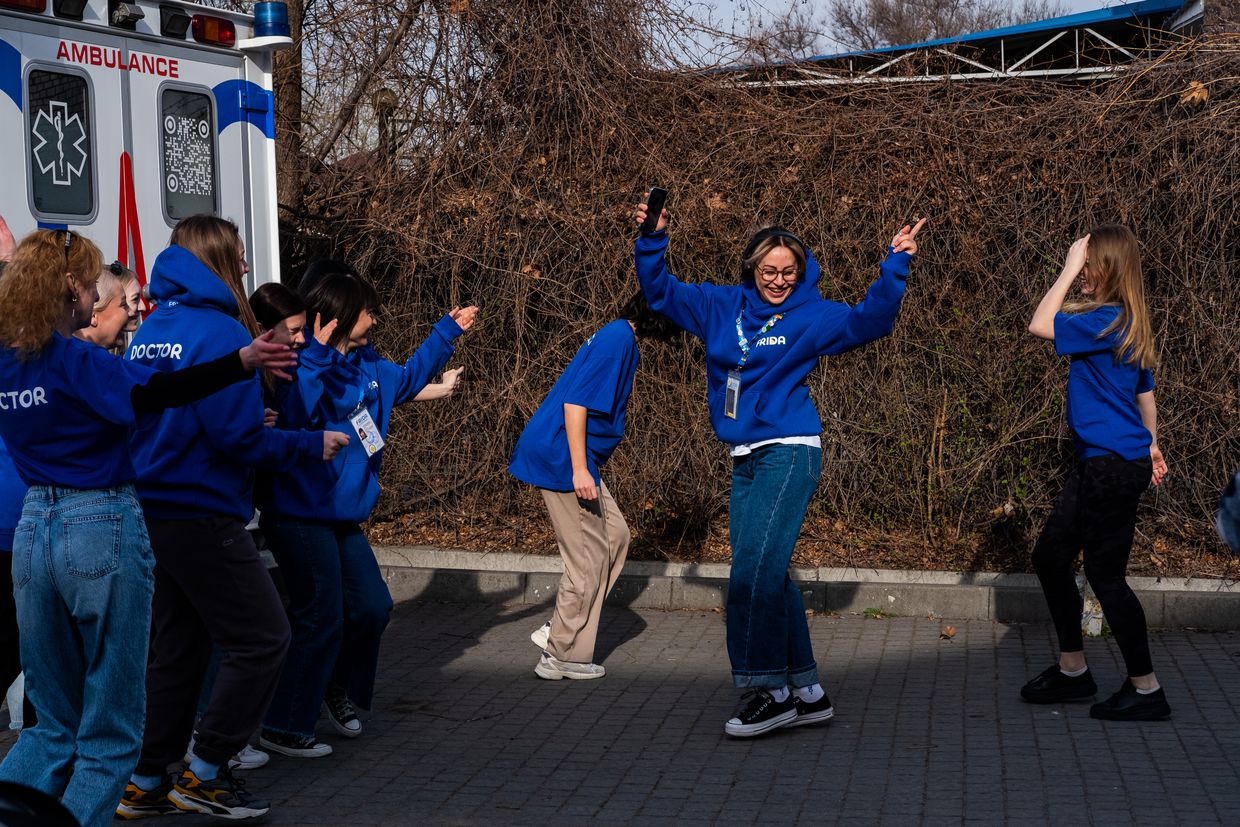
When the FRIDA workforce arrives in Kamiane, a rural settlement in Zaporizhzhia Oblast about 38 km (24 miles) from the entrance line, a crowd of villagers begins to kind exterior the Soviet-style two-story cement brick constructing greater than an hour earlier than the clinic opens. Most are pensioners, milling about and catching up with neighbors.
— Do you’ve got bother sleeping?
— Simply after they’re bombing us.
Inside, a workforce composed of greater than a dozen specialists is a whirlwind of motion, remodeling the house into an in depth hospital with the tools from their ambulance. Stacked packing containers of capsules and prescription glasses are unloaded in a row to create a makeshift pharmacy. Indicators are taped to completely different doorways marking the docs behind them — heart specialist, oncologist, gynecologist, neurologist are amongst them — and an consumption space simply inside the doorway is ready up with laptops and kinds to greet the arrival sufferers.
When the doorways open, the primary villagers method the desks to fill out kinds and listing the docs they’re right here to see. The preferred are the heart specialist and ophthalmologist, whereas virtually nobody reveals up asking for psychological well being therapy.
However after sufferers full their consumption, the docs wave them towards a soft-spoken younger lady sitting on a picket chair within the nook with a laptop computer throughout her knees. Whereas ready for his or her docs, every affected person is requested to reply a survey of ten questions, although its true function isn't marketed.
"Do you’ve got bother sleeping?" asks Anastasiia Tsyubchenko, a psychologist and therapist who makes a speciality of trauma. “Do you ever really feel anxious or expertise panic assaults?”
"Simply after they’re bombing us," responds an older lady with trembling fingers in a white knitted cap.
Tsyubchenko was working in human assets when the full-scale invasion broke out, however watching her nation rally for its survival motivated her to return to highschool for a psychology diploma. Now, throughout the work week, she treats veterans, civilians, and households of navy personnel. Her go to to Kamiane is her sixth weekend volunteering with FRIDA, having additionally joined missions in Sumy, Donetsk, Kherson, and Chernihiv oblasts.
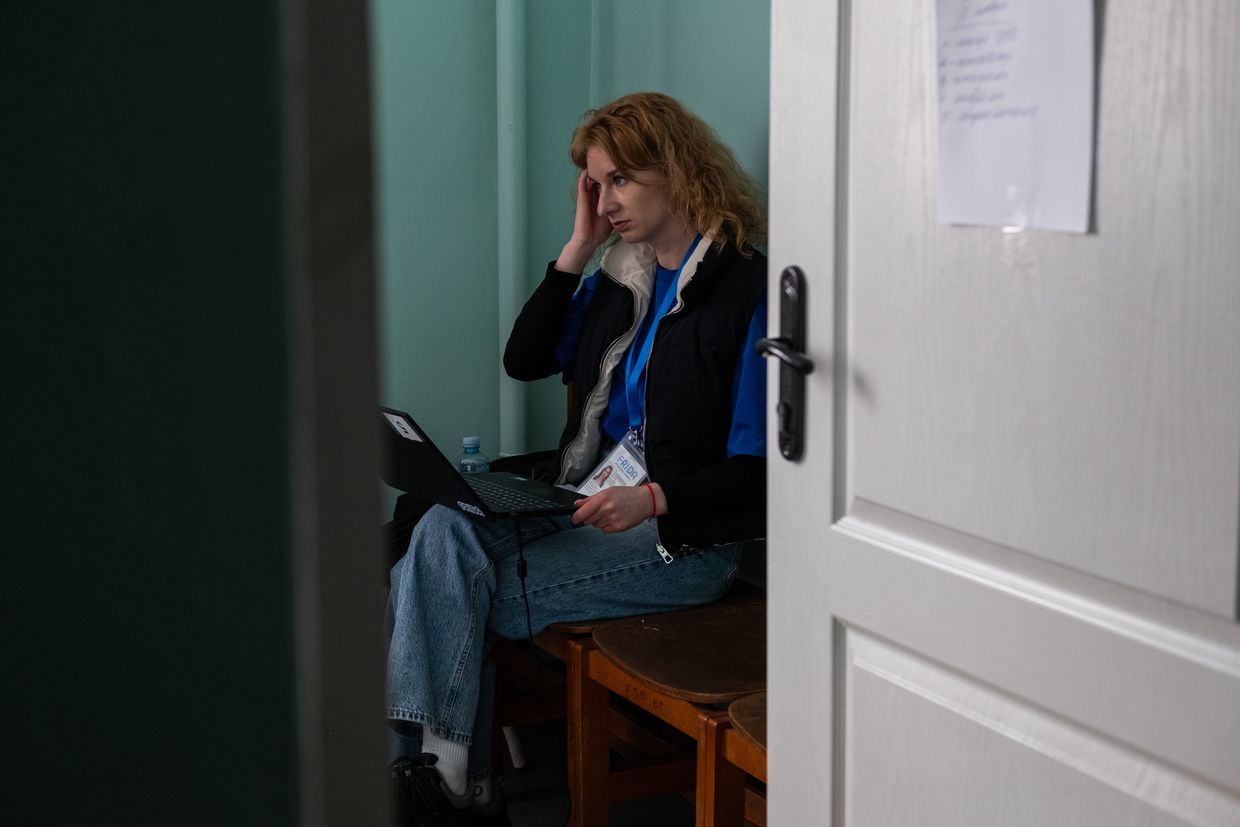
On the volunteer missions, they usually encounter feelings of individuals in disaster, she says. "When kin are on the contact line on the entrance, it’s very troublesome, particularly for moms and wives. They’ve fixed stress. When a relative dies, they grieve. Right here, too, folks dwell in these front-line areas with fixed explosions, fixed threats. They see all of it, hear all of it. It’s extra acute for them."
When she asks one man in a worn brown cap whether or not there are occasions that intrude on his ideas or that he can’t cease fascinated about, he begins to tear up. After he responds "sure" to greater than 4 of the screening questions, she recommends he return for a person counseling session along with her later within the afternoon. As a result of psychological well being reduction isn’t an instantaneous repair, FRIDA directs folks to companion organizations that supply a course of 10-12 distant periods for free of charge to the affected person.
"Folks generally don’t totally perceive their scenario themselves, or don’t really feel that they want psychological therapy, even when issues are vital and affecting their well being," says Olena Poskanna, who heads FRIDA’s psychological well being division. "That’s why we launched the affected person survey."
Excessive charges of hysteria, despair
Whereas FRIDA's work in Sumy and Zaporizhzhia is funded by the German Federal Ministry for Financial Cooperation and Growth and carried out by GIZ Ukraine, different organizations are much less fortunate. Different cellular well being clinics that have been depending on USAID cash have halted their operations.
“Round 85% of sufferers come (to the neurologist) they usually’re certain that the issue is within the backbone, that the issue is some place else, and never of their psychological well being.”
Final yr, FRIDA volunteers handled greater than 13,000 sufferers for various medical points throughout 76 missions. The group's psychological well being division screened greater than 3,500 front-line residents. A preliminary knowledge evaluation by the group discovered that simply over two-thirds of respondents had signs that led its specialists to advocate further counseling.
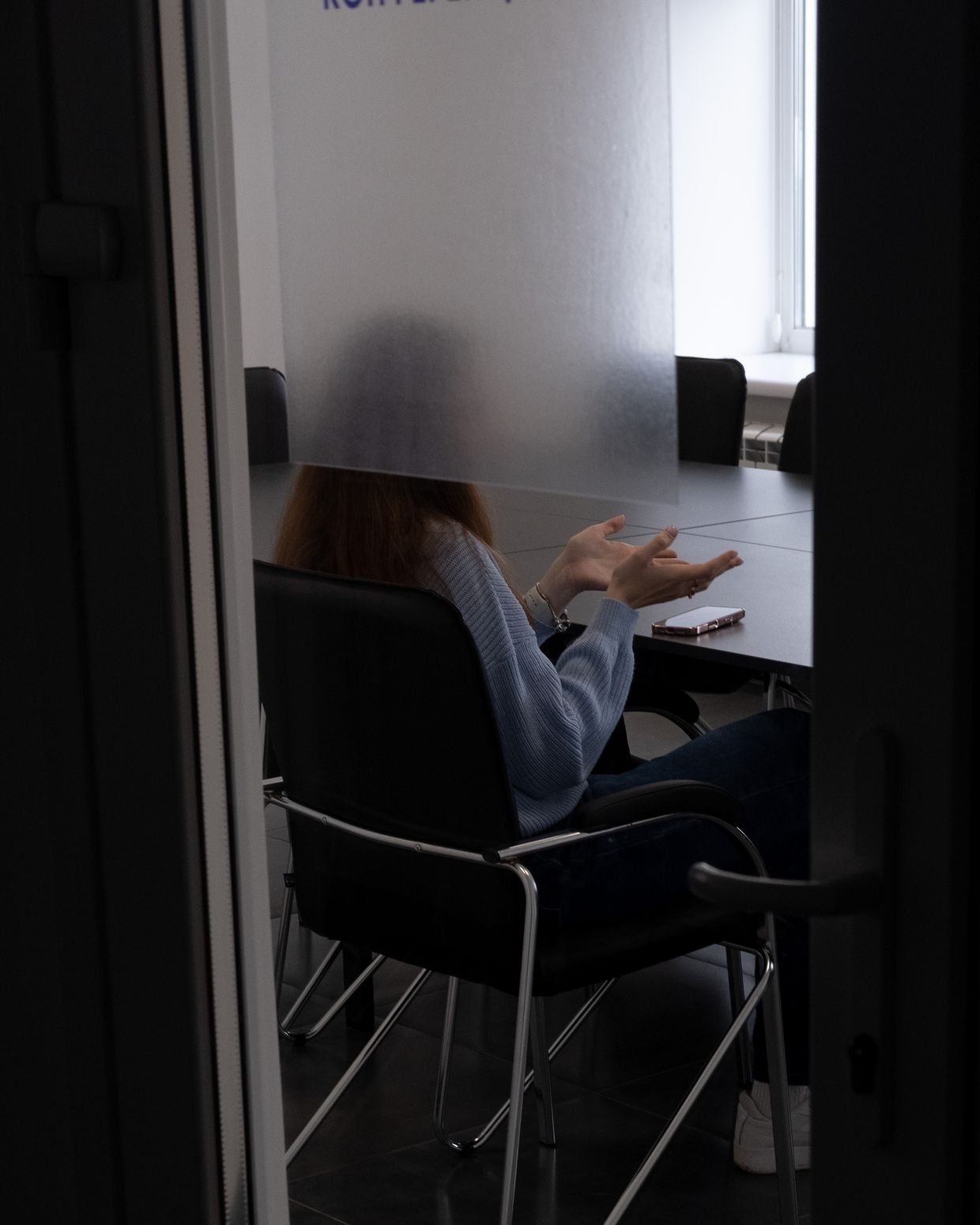
Olena Mazurenko, a neurologist who has participated in practically three dozen FRIDA missions in two years, says many sufferers search her out to deal with bodily signs with out realizing their trigger is despair or anxiousness.
"Round 85% of sufferers come they usually’re certain that the issue is within the backbone, that the issue is some place else, and never of their psychological well being," says Mazurenko. "The affected person might not really feel or acknowledge that they’ve anxiousness, however could have points with their nervous system."
With cautious questions and bodily evaluations, she teases out the underlying reason behind the residents' illnesses. If treatment is required, she is going to write an preliminary prescription and stroll them via find out how to communicate to their native docs for follow-up therapy. The method can embrace teaching sufferers via their fears.
“I had 35 sufferers right now, and someplace round 28 or 29 had anxiousness dysfunction. The preferred (medication) packing containers are mine.”
Over the course of the day in Kamiane, greater than 100 villagers cycle via the constructing, seeing a mean of three docs throughout their go to. The hallways are full of aged sufferers ready for his or her flip to see the specialists.
Though few arrive in search of psychological well being therapy, when the volunteers start taking down the indicators and packing up packing containers on the finish of the day, Mazurenko factors to the pharmacy. The pile of hysteria and despair medicines has dwindled.
“I had 35 sufferers right now, and someplace round 28 or 29 had anxiousness dysfunction. The preferred (medication) packing containers are mine.”
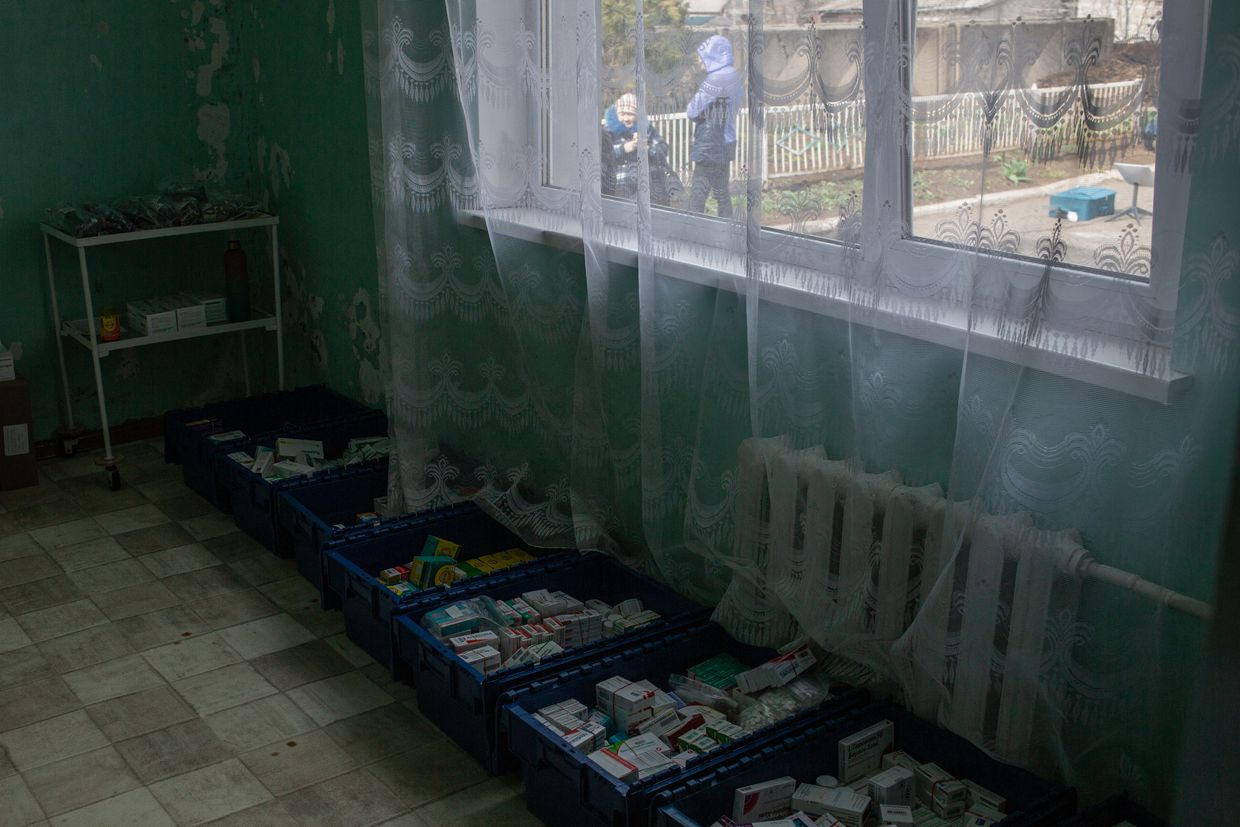
Observe from the writer:
Hello, I'm Andrea Januta, thanks for studying this text. Telling tales from hard-hit front-line communities, like Savyntsi and Kamiane, is significant however troublesome work. To fund our reporting, we depend on our neighborhood of over 18,000 members from world wide, most of whom give simply $5 a month. We’re now aiming to develop our neighborhood to twenty,000 members — if you happen to appreciated this text, take into account becoming a member of our neighborhood right now.
 The Kyiv IndependentFrancis Farrell
The Kyiv IndependentFrancis Farrell
